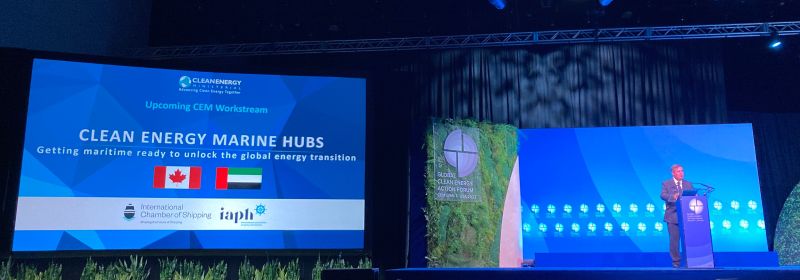A new Clean Energy Marine Hubs announced at the GCAEF

Pittsburgh, USA. 23 September 2022
- Clean Energy Marine Hubs (CEMH) platform officially announced at Clean Energy Ministerial (CEM) in Pittsburgh
- Envisaged as a truly public-private platform between energy, maritime, shipping and finance communities, the CEMH, the platform will aim to de-risk investments in future clean fuels
- Canada, Norway, Panama, United Arab Emirates and Panama announced as early participants in public-private platform between energy and maritime sectors to de-risk investment in future fuels
- International Chamber of Shipping (ICS), International Association of Ports and Harbors (IAPH) and the Clean Energy Maritime Taskforce are partnering up to develop initiative with participating to increase supply of zero-carbon fuels
Pittsburgh, USA. 23 September 2022: Together with the International Chamber of Shipping (ICS) and the International Association of Ports and Harbors (IAPH), the governments of Canada, Norway, Panama, the United Arab Emirates and Uruguay, unveiled a ‘Clean Energy Marine Hubs’ (CEMH) at the 13th Clean Energy Ministerial (CEM13) underway at the Global Clean Energy Action Forum (GCEAF). Other member governments and partner organisers are expected to follow.
The CEMH is envisaged to be a platform to bring together public and private sectors across the entire energy-maritime value chains (energy, ports, finance and shipping sectors), with the aim of accelerating the pace of deployment of production and transport of fuels with low life-cycle emissions via maritime including the use of these fuels directly for shipping.
Key early actions will include facilitating information and knowledge exchange on policies, programmes, and decarbonisation projects to de-risk investment and accelerate the commercial deployment of alternative fuels and technologies across countries.
“Currently, the expansion of the UAE’s hydrogen economy is in process with mega projects involving several of our leading ports. The two-gigawatt green ammonia project by Taqa, the Abu Dhabi National Energy Company, and Abu Dhabi Ports is one such project that will produce green hydrogen and process it into liquid ammonia, to be used in ships as bunker fuel and for export. This coupled with other endeavours by our ports will reinforce the UAE’s position as a key competitive maritime hub,” Nawal AlHanaee, Director of Future Energy Department, the UAE Ministry of Energy and Infrastructure, said. “Therefore, we are looking forward to our collaboration with all international governments, such as Canada, to reinforce the adoption of hydrogen technologies and fuels.”
Recent research from the International Renewable Energy Agency has emphasised the importance of shipping’s role in the global green transition. By 2050, the shipping industry is expected to transport at least 50% of all traded zero-carbon fuels.
The Clean Energy Marine Hubs Initiative is backed by more than 150 CEOs and government representatives, who voted to take forward plans for its creation at an ICS summit in June this year.
“Resolving the energy transition challenge for shipping and the wider world requires broad-looking, multi-sector solutions. Ports have a vital role to play, not only as bunker infrastructure providers but as new energy hubs in order for the economics around zero emissions fuels to work. Securing the backing of national governments, like that of Canada and the UAE today, will help kickstart collaboration between energy producers and the entire maritime value chain in getting those first hubs established,” Patrick Verhoeven, Managing Director of the IAPH, commented.
“To be successful we need to target our activities towards the transition of the whole zero-emission fuels market. The Clean Energy Marine Hubs Initiative will not only support the global clean energy transition but will propel the development of the zero emissions infrastructure that we can all benefit from,” Guy Platten, Secretary General of the International Chamber of Shipping, noted.
“Our taskforce will now work with the governments of Canada and the UAE, along with other governments to bring forward a tangible workplan for the next CEM that will ensure that the tremendous opportunities of zero emission fuels can be fully realised, produced at scale and safely delivered for all.”